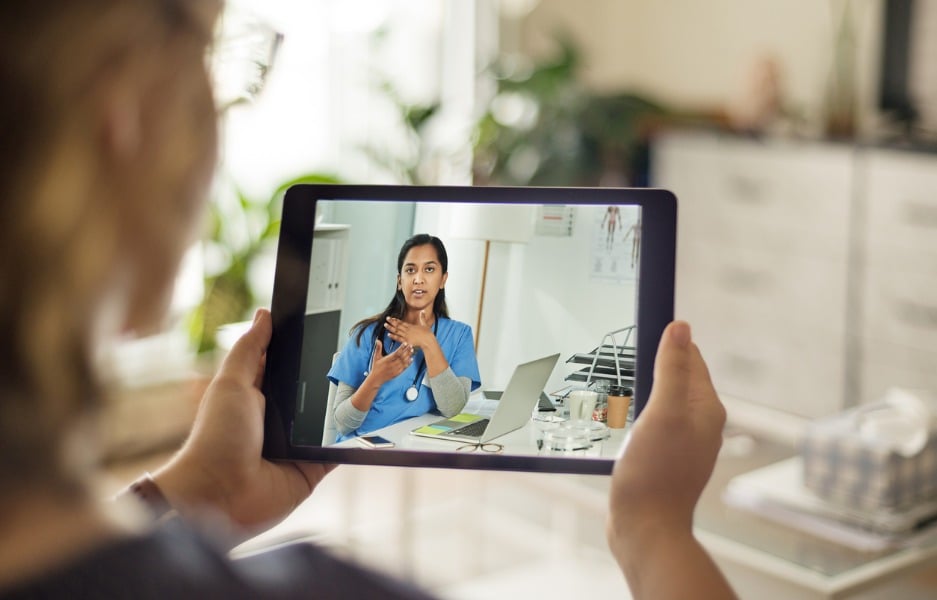What do today’s patients want from their healthcare providers? According to a recent survey from Accenture, healthcare providers’ digital capabilities will play a strong role in how consumers choose their care.
Over the years, consumers’ demand that healthcare providers offer greater digital services (including receiving and sending email, receiving text reminders, and communicating with providers through video conferencing) grew significantly.
A recent report from Accenture highlights just how true that is. In Accenture’s 2019 Digital Health Consumer Survey, more than half of all patients expected their providers to have digital capabilities. Seventy percent of patients were more likely to choose a provider that offers reminders for follow-up care via email or text, and 68 percent wanted the ability to schedule, change, or cancel an appointment online.
Accenture surveyed nearly 8,000 people in seven countries (Australia, England, Finland, Norway, Singapore, Spain, and the US), asking participants 18 and older to share their attitudes toward traditional and non-traditional healthcare services delivery. (“Traditional” healthcare services delivery refers to visiting a provider at an office, clinic, or hospital, whereas “non-traditional” healthcare services delivery refers to walk-in or retail services clinics, outpatient hospitals, virtual health, on-demand services, or digital therapeutics.)
Additional Insights from the Accenture 2019 Digital Health Consumer Survey
Accenture’s survey findings show that younger generations—Gen Z and Millennials—are the most dissatisfied with a number of aspects of traditional care. Gen Z is defined as people being born after 1997, while Millennials are those born between 1981 and 1996. Here’s what makes Millennials and Gen Z unhappy about traditional healthcare:
- Lack of responsiveness to follow-up questions outside of the appointment (24% of Gen Z and 15% of Millennials)
- Excessive wait time and speed of appointment (18% of Gen Z and 21% of Millennials)
- The inconvenience of appointment times (15% of Gen Z and 16% of Millennials)
Although Gen Zers and Millennials may be the most vocal about it, older generations, such as Baby Boomers and the so-called “Silent” Generation (born between 1928 and 1945) aren’t satisfied with traditional healthcare services delivery either. Here’s how they feel:
- For 57% of Baby Boomers and the Silent Generation, customer satisfaction hinges on the convenience of appointment times.
- 63% of older patients would be satisfied with better responsiveness to follow-up questions.
- 53% of older patients are looking for improved wait time and speed of appointments.
Moreover, non-traditional healthcare services delivery offers the same levels of satisfaction with the convenience of location or channel, convenience of appointment times, responsiveness to follow-up questions, and the efficiency of operations.
It is clear that today’s consumers want healthcare that meets their needs, rather than changing their schedule to accommodate their provider. Simply put, patients are looking for a good experience at every touchpoint with a healthcare provider or facility.
Give Patients What They Want with a Healthcare Cloud Communications Solution
The Accenture survey puts a particular spotlight on communications and collaboration software for medical providers, which has the potential to address consumers’ concerns and greatly improve the patient experience. Communications and collaboration solutions often include voice, video meetings, team messaging, and contact center technologies. Many providers use some or all of these technologies, but often from multiple different vendors, which creates silos of disconnected communication that often lead to the problems Accenture describes. The more they can integrate these technologies, however, the more they can connect staff, administrators, and patients to streamline workflows and improve overall experiences.

Download RingCentral’s Top Digital Patient Expectations for Your Medical Facility infographic.
We’ve identified three significant ways in which a healthcare cloud communications and collaboration solution can help improve the patient experience:
- Appointment scheduling
- Patient follow-up
- Digital experiences
Appointment Scheduling
In its 2019 study on consumer attitudes toward healthcare, Deloitte identified the need to adapt to changing consumer needs, demands, and expectations as one of the top concerns globally for healthcare providers. For example, the report noted that many public and private sector providers are taking steps to make appointment booking easier because it’s one of the most frustrating parts of the healthcare experience.
A healthcare cloud communications solution makes appointment scheduling easier. At smaller practices, calls are forwarded to a desk phone as well as a mobile phone and laptop, while larger practices have IVR technology in place to route the call to a live agent. The secretary at a small practice answers the call on the mobile phone and books the appointment at the computer; at the larger practice, the patient’s information automatically appears on the agent’s screen. With this technology in use, patient experience during appointment scheduling improves.
Patient Follow-Up
Often, after an appointment ends, the patient comes up with a question to ask the provider. To ask that question, the patient has to book another appointment. While patients in generations’ past accepted that standard, today’s patients don’t.
That’s where a healthcare cloud communications platform comes into play. Patients call a care navigator helpline or log in to a secure portal to ask questions and get the answers they need, without having to book an appointment. Once again, a comprehensive healthcare communications platform delivers a positive experience during any patient follow-up encounter.
Digital Experiences
Healthcare professionals realise that providing digital experiences to patients is important. In fact, 81 percent of payer executives say their company is investing in technology to improve the patient experience; however, it’s all about investing in the right technology.
Healthcare cloud communications solutions allow providers to confirm appointments by secure texts and emails or hold video conferences with patients or colleagues, and to measure patient satisfaction with automated surveys.
Patients Demand More—So Should You
Today’s patients are empowered to demand more from their providers. Choosing an effective technology solution helps you satisfy those needs and maintain a competitive edge in a challenging healthcare market. Demand more from your healthcare communications system.
Updated 23 Mar, 2020




